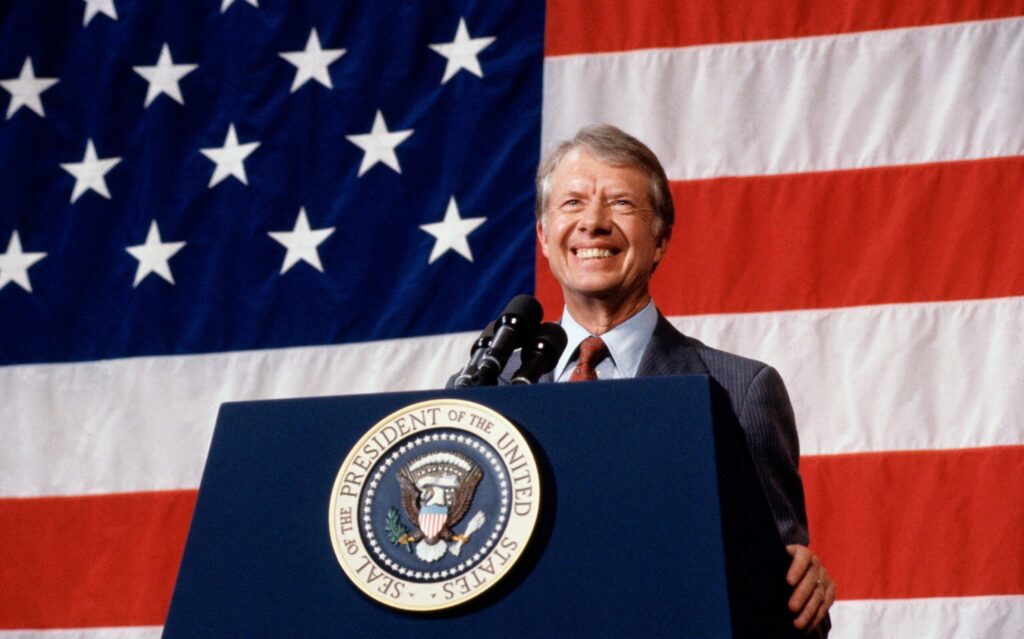On the 29th of December 2024, former president Jimmy Carter passed away at the age of 100. The state funeral took place on January 9, at the Washington National Cathedral. Among its attendees were all five living presidents. Joe Biden delivered the eulogy, while Steve Ford, the son of former president Gerald Ford, read the posthumous eulogy of his father. Two of Carter’s grandchildren, Jason and Joshua Carter, also spoke at the funeral.
The various eulogies, as well as more than a week of public obituaries and tributes to Carter, highlighted Mr. Carter’s integrity, pursuit of justice, and strong faith. Reading these tributes and learning about Carter’s life reminded me of Eastern University’s motto: faith, reason and justice. Carter’s life is an example of how to live out this motto.
Carter had modest beginnings. He was raised on a peanut farm without running water in the rural south and served in the navy during WWII. Although he would go on to become the president of the United States, Carter never forgot the down to earth morals and strong faith that he developed early in life. Carter was a pious Christian, who attended church regularly, taught Sunday school, and was known for his strong Baptist faith. However, his actions best demonstrated his faith. Known as “the peace-making president,” in his time in office, Carter’s humanitarian efforts following his presidency even better demonstrate his faith in action. For example, President Carter and his wife of 77 years, Peggy, led the Jimmy & Rosalynn Carter Work Project for Habitat for Humanity for over 30 years. His work included helping to build houses with his own hands well into his 90s. Carter’s work for Habitat for Humanity was only one of his many humanitarian efforts. He won the Nobel Peace Prize in 2002 for his “untiring effort” to promote peace and human rights. In his eulogy for his grandfather, Joshua Carter said that President Carter served his neighbor with this untiring effort “for one simple reason: he worshiped the Prince of Peace and He commanded it.”
In his posthumous eulogy, former Vice President Walter Mondale, who ran alongside Carter, also reflected on the simple reason of Carter. Although Carter possessed the highest position of power, he did not let this get in the way of his respect for others. Mondale reflected that he and Carter had an unusual relationship, because Carter did not engage in the complex political power games, but rather maintained a simple respect for the humanity of others.
Carter was also known for his promotion of justice. During his presidency, Carter worked to combat racial and economic inequality and to promote women’s rights and a healthy environment. Even when his opinions were unpopular, Carter stood on the side of justice. For example, In 2007 he published a book, Palestine: Peace, Not Apartheid, on the ongoing apartheid and oppression happening in Palestine. The book was met with immediate backlash and accusations of bias and even antisemitism. However, Carter stood by his book and was willing to take the backlash in order to promote peace and raise awareness concerning “the horrible oppression and persecution of the Palestinian people.” Perhaps this attitude arose, again, from his upbringing. Carter grew up in the segregated south, but his mother openly refused to acknowledge racial distinctions.
In a statement after Carter’s death, former president Joe Biden said, “To all of the young people in this nation and for anyone in search of what it means to live a life of purpose and meaning — the good life — study Jimmy Carter, a man of principle, faith and humility.” Perhaps we, as students at a Christian university, should study the life of Jimmy Carter. We should look at the way Carter got his hands dirty building houses for the poor, listened to others even as the executive leader of the country, and stood by the oppressed at the expense of his good name. We should strive to similarly live a life dedicated to faith, reason and justice.
Sources:
NYT
NPR
Baptist News
Nobel Prize

